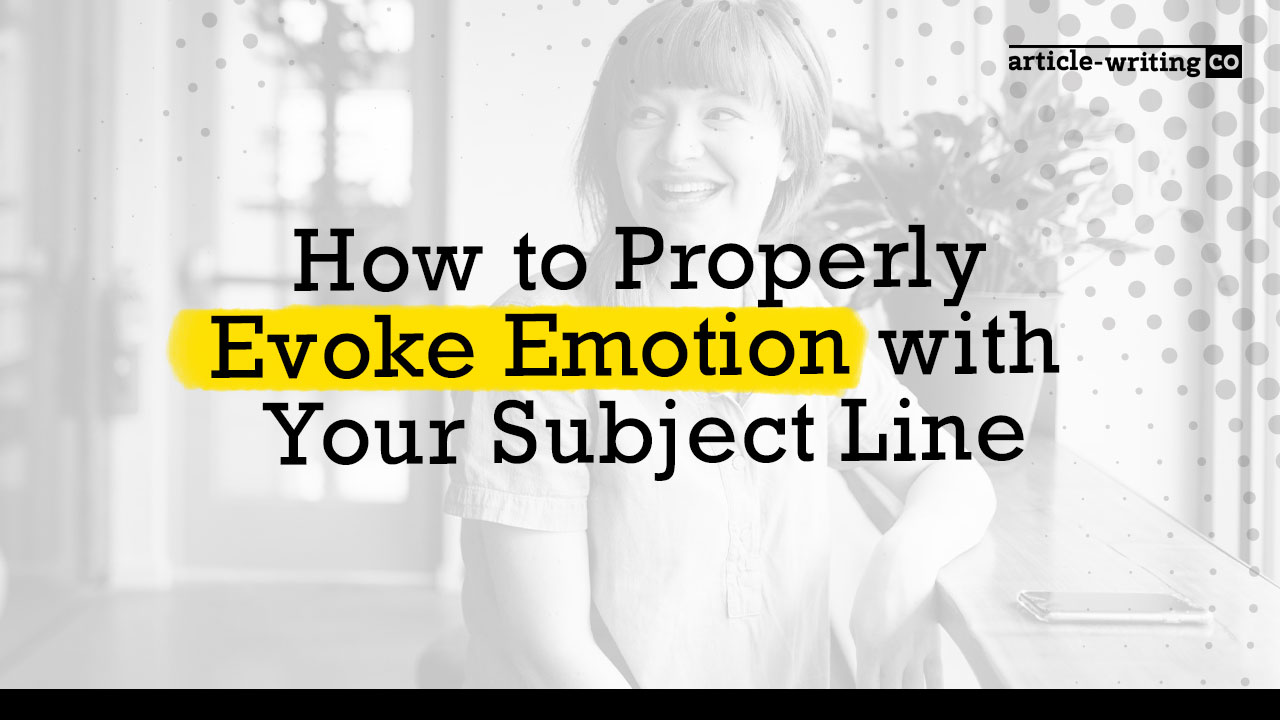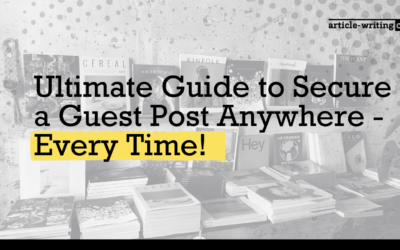Have you ever noticed how some email subject lines make you feel a certain way? They might make you curious, excited, or even angry. The best email subject lines are the ones that provoke an emotional response, which is why they are so effective. When email marketing with content writing, first impressions are everything.
Think about it this way: when you see an email in your inbox with a subject line that evokes an emotion, you are much more likely to open it and read the message than if the subject line is bland and uninteresting. So, if you want people to actually read your emails, it’s important to write subject lines that provoke emotions. But how do you do that?
Who would ever think that an email subject line was so important? Well, anyone familiar with email marketing content writing who has never received a response and been ignored might have a clue. Author of the Wall Street Journal bestseller, Everybody Writes Your Go-To Guide to Creating Ridiculously Good Content, Ann Handley
“Writing doesn’t have to be long to be meaningful. I’d argue that the words we use everywhere – on our websites, landing pages, LinkedIn profiles and so on – are just as important as the words we use in places we typically think of as ‘writing.’ ”
Email marketing content writing is important, like really, really, important. A statistically significant, 80% of people prefer sales reps to contact them via email. Moreover, 33% of people will decide whether or not to open that email based on the subject line.
How frustrating it is to write a beautiful email that you’re sure will be a hit with its readers with a great offer or essential information inside, only to find that you don’t have any readers because your subject line stinks. Most likely, you’re dying to see the second one, right? But why? The answer is – emotion.
The most intrinsic part of being a human is emotion. Emotion determines how we act and respond to the stimuli around us. That extends to even the most mundane experiences like deciding to click open on an email.
Let’s take a look at the different emotions that elicit response from readers, how to execute them, and some to avoid using altogether.
Provoke Excitement & Joy
The example above about the Broadway show had an element of excitement. It gave the reader something to look forward to when considering seeing the show.
Use positive words: Words like “amazing,” “incredible,” and “unbelievable” can generate excitement and curiosity. People want to know what’s so amazing, incredible, or unbelievable, so they’ll be more likely to open your email. Just be careful not to overuse these words, or people will stop taking your emails seriously.

Using excitement or joy as emotional elements for your subject line is great for generally good or helpful news or content.
You want to engage your readers excitingly through your subject line, but how?
- Make your subject line THRILLING! Don’t be scared to use an exclamation point or caps to top off your exciting intro, but careful not to overdo it. There is a huge difference between:
Simply delightful looks that are MUST HAVES for this summer!
AND SIMPLY DELIGHTFUL LOOKS THAT ARE MUST-HAVES FOR THIS SUMMER!!!!
The latter takes it from exciting to aggressive.
- Consider your word choice. Use words that promote excitement and anticipation, like: Introducing, Delighted, Thrilled, Eager, Inspired
- Excite your readers for this moment.
Independent consultant and one of Entrepreneurs 50 Online Marketing Influencers to Watch, Jordie van Rijn said it best,
“Attention is always real-time. You don’t have to create the most interesting thing ever, just the most interesting thing at the moment.”
Apply this to your subject line method and keep their attention by using an offer or comment on something relevant to now, not down the road. Use present tense when discussing the content of the email (this, now, current, etc.).
Use Personalization
Addressing your reader by name is a great way to create a personal connection. When people feel like they have a personal connection with you, they’re more likely to pay attention to what you have to say.
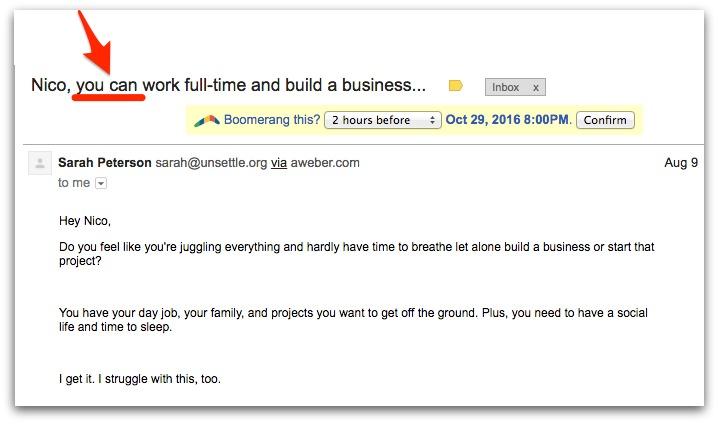
Be specific
Vague email subject lines are less likely to generate any sort of emotional response. Instead, be specific about what’s inside the email. For example, “5 Ways to Boost Your Sales” is better than “Ways to Boost Your Sales.” The more specific you are, the more likely people are to open your email out of curiosity or interest.
It’s important to be specific to pique the curiosity of your audience. For example, who cares about something this vague:
“Can you deal with these?”
These what? Why should we care about “these”?
Use numbers
Studies have shown that emails with numerical digits in the subject line are more likely to be opened than those without numbers. This is likely because numbers make the content seem more concrete and actionable.
So instead of “Ways to Boost Your Sales,” try “10 Ways to Boost Your Sales.”
Use Negative Words
Use negative words: Words like “never,” “worst,” and “doomed” can generate anger and anxiety. These are called “negative trigger words” because they trigger negative emotions.
People want to know what they’re doing wrong and how they can avoid disaster, so they’ll be more likely to open your email. However, use these words sparingly, as too many negative emotions can lead people to unsubscribe from your list.
Create a Sense of Urgency
People are more likely to open an email if they feel like they need to act fast. You can create a sense of urgency by using phrases like “act now,” “limited time only,” or “urgent.” Just be careful not to overdo it, as too much urgency can come across as desperate or spammy.
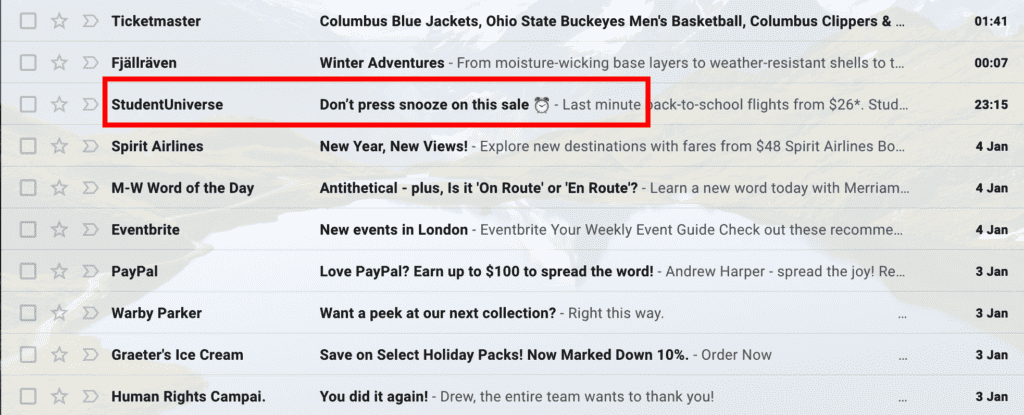
Urgency and excitement can go hand and hand, the difference between the two being the reaction from the reader. Creating a sense of urgency to open your email through your subject line can be done by using strategies that include limited-time offers and time sensitive material.
Your reader should see the subject line and feel the need to open the email lest they miss a crucial opportunity. There are two different ways to increase urgency by tweaking your wording.
The first, is a straightforward message within the email, telling the reader the content requires their attention.
Examples:
- [Action Required]
- [Time-Sensitive]
- [Urgent]
- [Please Reply by (date)]
The second wake is to evoke this response is to use vocabulary and tone to show or make the readers feel the urgency of the email.
Examples:
- “Last chance for your discount!”
- “Sale from now through November”
- “Buy now; limited supply only”
Be Interesting
Your email subject line needs to be interesting enough that people actually want to read it. No matter how well you follow all of the other tips on this list, if your subject line is boring, no one is going to want to read your email—no matter how great the rest of the message is. So take some time to brainstorm creative ways to capture attention with your subject line.
Use curiosity in your subject line to present that gap, giving a substantial reason or draw to open it, and then bridge it with your email marketing content writing.
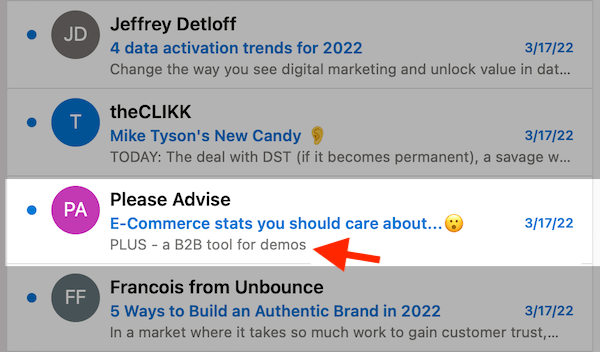
When composing a cleverly curious subject line, keep it relevant to your readers and make them care and wonder about the content of your email. One way to do this is to employ two elements that aren’t normally associated with one another:
“What a cat can teach you about achieving the writer’s life”
The mere thought of a cat teaching you something about writing is both humorous and open-worthy.
Only click-bait your audience, though. Whatever has them wondering from reading the subject line should be clear in the email, otherwise, you’ll just leave them feeling misled.
Speak Directly to a Reader
Top social media influence and founder of A Real Change International, Inc. and Sandpaper Tablet, Inc., Sandy Krakowski says,
“Lead people with what they want. – Lead with what they’ve already said. – Lead people from where they’re at. – Lead them with the things that concern them.”
Drawing a line from her quote to how to craft an emotionally compelling subject line, your email marketing content writing should keep your reader at the forefront of their mind.
How do you appeal directly to your reader? Make it about them by speaking directly to them.
- “Facebook’s New Pixel: What You Need to Know”
- “Become a Certified Digital Marketing Professional”
- “3 wicked AdWords tactics to increase your ROI”
Offer them something exclusive that will provide them value
- “Google Compliant Landing Page Checklist [Download]”
- “[Flash Sale] A 7-Step ”Paint By Numbers” Process for FB Campaigns”
Subject Lines with Emotions and Mistakes to Avoid
- Boredom – “Content Marketing Advice”
- Aggression – “CONTENT MARKETING ADVICE!!!!!!!!!!!!!”
- Misspellings and grammar problems – “Contant Market Advce”
- Misleading subject – “These email marketing tips will change your life!” (email is about social media marketing and doesn’t mention emails at all…and subsequently won’t change your life)
- Emoji Overload –“ 👍😁💅😎👽🎃 Check out these cool tips!”
- Vague language – “Get Advice on This Thing.”
Let an expert in email marketing content writing take it from here
A subject line can pull at emotions, stirring excitement and curiosity or providing exclusivity with urgency for a harmonious combination that screams “open me!”
There are a ton of ways to combine emotions for the perfect subject line, and a ton more ways to mess them up.
Experts in email marketing content writing are well versed in writing strategic, engaging content within the email but are also no stranger to the perfect subject line.
Stop having Jane the secretary, write your emails and subject lines, and outsource the work to a professional writing agency staffed with professionals in email marketing content writing that know how to elicit response from your audience.
With a professional writing service, you’ll have someone to assist in making your email marketing campaign a success and have access to other resources like blog and article copywriters (that know how to write headlines that grab attention) and social media management.
Email Marketing in Content Writing
Email subject lines that provoke emotions are more likely to get opened and read than those that don’t evoke any sort of response at all. If you want people to actually read your emails, use some of these tips to write subject lines that will generate excitement, curiosity, anger, or anxiety—just be careful not to overdo it!

David is the Founder and Director of article-writing.co, the fastest-growing content creation agency in North America. He has transformed companies by offering high-quality content that has impacted their SEO ranking, revitalized websites with engaging and industry-relevant blogs and website copy, and championed successful email campaign copy.

